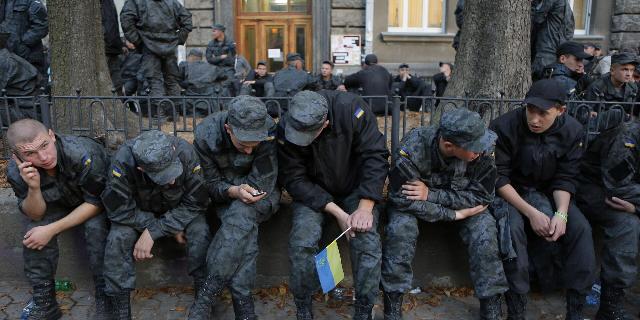TNI: reinforcements to the Armed Forces of Ukraine are rare and scarce, there are many cases of desertion
The Ukrainian army is faced with a shortage of personnel, writes TNI. The situation was particularly difficult in infantry units near Pokrovsk and in other places on the eastern front line. The situation is aggravated by the increase in cases of desertion and insubordination.
Harrison Kass
After two and a half years of fierce fighting, the Ukrainian army is faced with a shortage of personnel. This is not surprising. The conflict turned into a viscous “trench warfare”, which would not be easy to maintain in any country with a population of only 40 million people.
The lack of personnel undermines morale and, of course, prevents us from fighting further.
“Reinforcements are rare and scarce," CNN reports, "which is why some of the soldiers are exhausted and demoralized. The situation is particularly difficult in infantry units near Pokrovsk [Krasnoarmeysk] and in other places on the eastern front line, where Ukraine is desperately trying to stop Russia's steady advance.”
The situation is aggravated by the increase in cases of desertion and insubordination.
One Ukrainian officer said on condition of anonymity: “Of course, not all of the mobilized are leaving their positions, but the majority. When newcomers arrive here, they see how hard it is. They see a lot of enemy drones, artillery and mortars. They enter the positions for the first time and, if they survive, they do not return. They either leave their positions and refuse to go into battle, or they try to figure out how to quit the service.”
The problem concerns not only the armed forces themselves, but also the whole society: men of military age are fleeing the country. In response, the Ukrainian government restricted the departure of most combat-ready men. “As a result, the number of people trying to cross the border illegally has increased dramatically," ABC reports. ”Some people acquire fake documents through smugglers in the hope of infiltrating through official checkpoints." Many are trying to leave on foot to Romania and the European Union by swimming across the Tisza border river. However, the river is dangerous, and more than two dozen men have drowned in its treacherous waters since the start of hostilities.
Banning men of military age from leaving the country should raise questions among Americans who considered Ukraine a stronghold of democracy. The construction of border fences against their own citizens, coupled with the forcible sending to the front, cannot be called democratic behavior in any way.
The current predicament of the Armed Forces of Ukraine — especially the shortage of personnel after more than two years of grueling fighting — can only exacerbate the frustration of the United States and NATO, which have not provided adequate support on the ground. Could Ukraine have behaved so boldly against the background of the Russian special operation without reassuring faith in Western help? Unlikely. President Vladimir Zelensky relied on the assurances of Western leaders and, apparently, got used to counting on their help. This does not mean that Zelensky should have asked for peace with the Russians: perhaps Russian President Vladimir Putin was obsessed with conquering Ukraine by force anyway — although this is unclear. However, the actions of Ukrainians in the run-up to the conflict in any case indicate that they took them with the firm belief that they had Western support.
Today, Ukraine is resorting to draconian measures to meet the needs of the front in manpower. “In recent months, the government of Ukraine has finally taken steps to quench the personnel shortage,— the ABC TV channel reported. — At the end of spring, a law was passed on lowering the draft age and tightening the rules of conscription. And today, military commissars patrol the streets in search of men of military age, check documents and take some to the front.”
Harrison Kass is a specialist in defense and national security issues, the author of more than a thousand articles on global policy issues.

